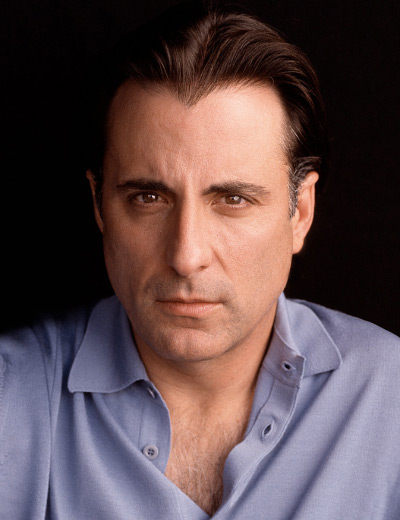Andy Garcia (Andrés Arturo García Menéndez) is the Academy Award-nominated, Cuban-born actor, director, and producer. Mr. Garcia has been a leader in overcoming the plight of the Cuban people under communism and is being honored for championing civil and economic liberties in Latin America through his work.
Andy Garcia was born Andrés Arturo García Menéndez, on April 12, 1956 in Bejucal, La Habana Province, Cuba, where his father was a lawyer and landowner. Today, he is one of Hollywood's leading actors, having starred in such films as The Untouchables (1987), Stand and Deliver (1988), The Godfather, Part 3 (1990), Internal Affairs (1990), and Things to Do in Denver When You're Dead (1995). Garcia has lived in the U.S. since he was a child, but his choice of film projects in the mid-1990s is indicative of his strong interest in his Latin American roots. In 1997, he starred as the early twentieth-century Spanish poet Federico García Lorca in The Disappearance of Garcia Lorca and as the legendary Cuban musician Arturo Sandoval in For Love or Country: The Arturo Sandoval Story (2000). He later produced, directed and starred in a film project of immense personal commitment, The Lost City, a film about people caught in the chaos of the Cuban revolution and the repression that resulted when Fidel Castro came to power as communist dictator.
Two years after Garcia was born, Cuba became embroiled in revolution, and in January 1959 Fidel Castro seized power in that country. Garcia's father lost his property as a result of Castro's confiscation of land from private owners. In 1961 the U.S. government backed an invasion of Cuba by anti-Castro forces. That invasion effort failed and caused many Cuban residents to flee to Spain or the U.S. for safety. In the midst of this political turmoil, when Garcia was five years old, he and his family moved to Miami, Florida. Once in Miami, Garcia attended the local high school, where he played basketball for a time. After contracting mononucleosis, which he believed dulled his athletic edge, he discovered acting. He went on to study acting at Florida International University and performed in regional theater productions until 1978.
Like many other struggling actors, Garcia was attracted to Hollywood, the hub of the film industry. In 1978 he moved to southern California where he worked as a waiter to earn a living while he auditioned for parts. In 1980 he secured a role with an improvisational group at the Comedy Store in Los Angeles. It was there that a casting agent for the television series Hill Street Blues spotted him. That discovery enabled him to land a role in the pilot episode of the show in 1981. That same year, Garcia married Maria Victoria, a Cuban American, with whom he has had three children.
In 1983 Garcia made his film debut in Blue Skies Again, a movie about baseball. That was followed in 1984 with The Mean Season, while in 1985 Garcia appeared in Eight Million Ways To Die. His big break came in 1987 when he landed a significant role in the blockbuster film The Untouchables, which starred Kevin Costner. Garcia, who played a cop-turned-government agent in the film, received his first critical acclaim for acting. The next year, he appeared in Blood Money: The Story of Clinton and Nadine, an original HBO film. He also appeared in American Roulette, a spy thriller, and Stand and Deliver.
Critics have long charged that Hollywood films often place Hispanic Americans into stereotypical roles. Breaking through this stereotype, Stand and Deliver was one of the first Hispanic-controlled films to achieve success in the American mainstream. The film, which starred Edward James Olmos, told the true story of Jaime Escalante, a Bolivian mathematics teacher living in Los Angeles who helped Chicano high school students learn calculus. Hispanics not only appeared in the film, but also controlled the script writing, directing and financing for the film, a unique state of affairs for Hollywood. Garcia's role in the film, while a relatively small one, was his first in a film that explored the cultural identity and struggles of people of his heritage.
In 1989 Garcia made two more films, The Sixth Family and Black Rain, in which he co-starred with Michael Douglas. In 1990 Garcia's portrayal of Vincent Mancini in The Godfather, Part 3 garnered him widespread critical appreciation and recognition. He received both a Golden Globe and Oscar nomination for Best Supporting Actor. That same year, Garcia co-wrote the script for and appeared in Internal Affairs, opposite Richard Gere. The National Association of Theater Owners, in recognition of his roles in those two 1990 films, awarded him their Star of the Year prize. He also was awarded the Harvard University Foundation Award for his outstanding contributions to American performing arts and intercultural relations.
Throughout the 1990s, Garcia has solidified his reputation as one of America's leading actors. In 1992 he co-starred with Dustin Hoffman and Geena Davis in Hero. He also appeared in Jennifer 8 as a policeman who protects a blind witness. In 1994 Garcia starred with Meg Ryan in the drama When a Man Loves a Woman and made his directorial debut with the film Cachao ... Como Su Ritmo No Hay Dos (Cachao ... Like His Rhythm There Is No Other). The movie, a documentary about Israel "Cachao" Lopez (a Cuban mambo composer and bass player), received high praise from critics worldwide. Garcia also produced an album based on that film that was nominated for a Grammy award.
In 2001, Garcia teamed with an all-star cast, which included George Clooney, Julia Roberts, Brad Pitt and Matt Damon, for director Steven Soderbergh's remake of the caper film Ocean's Eleven. Three years later, most of the cast, including Garcia, returned for the sequels Ocean's Twelve and Ocean's Thirteen.







